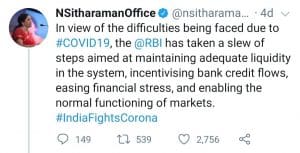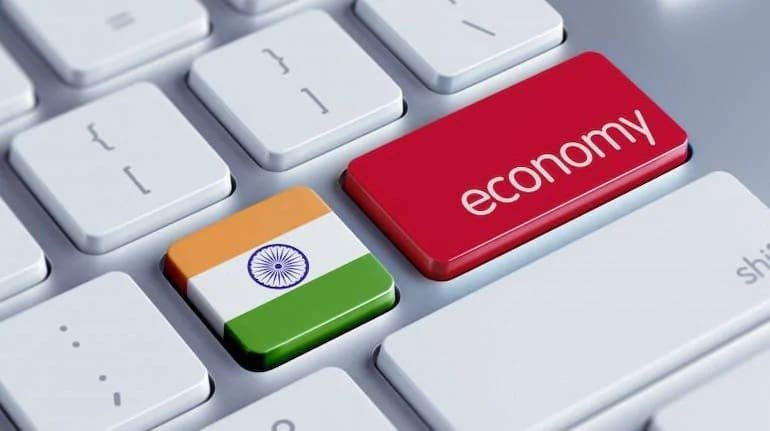Introduction It all started on 31st December 2019, at the close of the year a pneumonia of unknown cause reported to WHO China Office. This was detected in the city of Wuhan, China. According to the officials some patient were working in the seafood market at the centre of the city. On 26th May 2020, this unknown pneumonia named Covid-19 (corona virus) has confirmed around 5,603,715cases and 3,48,216 deaths in 213 countries/regions. Whereas in India there are 77,103 active cases and 4,172 deaths are already reported.
The cause of transmission is through respiratory droplets in a close contact with person to person which makes it more deadly because it leads to the community spread. To prevent this community spread, Indian Government has started a movement named JANTACURFEW on 22 March 2020 which later named as LOCKDOWN. This movement has been covered by almost all the countries in the world. In which no one is allowed to travel anywhere despite they need to go and buy some essential items for their living.
As due to these reasons all the production houses/firms/companies (except essential items) are closed. Neither buyers nor sellers are in the market. This could impact the whole economy. Not only a single country but whole world has been impacted with such disease. According to International Monetary Fund global GDP will shrink 3% in 2020, marking the deepest dive since Great Depression.
Economic Analysis
“There will be a hit of 0.3-0.5% on the GDP in the next fiscal year,” said one of the officials aware of the estimate. Growth of the economy is 5% in the current year which is lowest in 11 years and this also could be 4% after few months as the pandemic is growing day by day in India. This also can be predicted that the economic growth in the next financial year (FY21) would only be 6-6.5%.
There are following sectors which hit the most due to pandemic, these are;
- Tourism
- Aviation
- Hospitality
- Manufacturing
- Retail and
- Trade
Foreign Investors are pulling out their money from the Indian market as FII at its low in the past recent years which is weakening the rupee although RBI has swapped $2 billion in foreign exchange.
At this time we really need to increase the liquidity in the market so that people have money in their pocket to spend, ease bad debt rules so that a hope could be generated for returning the amount. Ease the regulations of doing business so that people can invest in their businesses which help in reducing the unemployment because in this pandemic situation it is the biggest issue world is facing. According to data from Centre for Monitoring Economy (CMIE), unemployment rate almost tripled in the week ended March 29 to 23.8 per cent from 8.4 per cent a week ago.

There are following steps which should be taken by the RBI and The Ministry of Finance using the monetary and fiscal policies;
Financing the MSME and MUDRA scheme:
Ministry of Micro, Small and Medium Enterprises was initiated by government of India in 2006 to regulate the new and existing entrepreneurs and their small or medium firm in order to strong the make in India concept.
Micro Units Development and Refinance Agency Bank provide loans at low rates to the new entrepreneurs so that they can initiate their ideas at the low interest payments.
By giving the leverages to these firms might enhance the confidence and surety of low risk might increase the number of people who would like to initiate their business. This could lead the liquidity in the market and reduce the unemployment. This is also beneficial for the future because we would ensure that our money will be in our country and we shall not buy and goods or services from the other country which are being available in our country.
Improve and Fund the NABARD and SIDBI:
National Bank for Agriculture and Rural Development is a financial organization to empower the farmers and rural area. In this pandemic, people who hit the most by the economy are poor people who were migrated from rural area into urban area to work as daily wages workers and almost all had lost their jobs.
Small Industries Development Bank of India is for empowering the small manufacturing units and initiates more. This could help the people who had lost their jobs and have no fund and plan to initiate their small business.
By improving above financial organization, people will be more reliable and depended on their own and obviously help the Indian economy.
Change in REPO and Reserve REPO rate:
The rate at which the RBI lends money to the banks for short durations is called repo rate and the rate at which banks can park their money with the RBI is known as reserve repo rate.
By reducing the repo rate, there would be more probability that the banks will lend the money from the RBI to further circulate it to the market and if RBI reduces the reserve repo rate than banks will not park their money into the RBI because the low interest and hence this money will also circulate into the market.
This step is necessary to increase the liquidity in the market so that people can borrow the money from the banks and invest it into the market.
Strategic Oil reserve:
It could be seen that the price of crude oil in the market is at its low since ever. On April 21, 2020, price was negative which means that the pandemic bringing the economy to a standstill, there is so much unused oil sloshing around the energy companies have run out of room to store it. If there is no place to put the oil, no one wants a crude oil contract. Actually sellers were paying buyers to take the stuff on their hands.
India needs to grab the opportunity in order to store the crude oil at this low price which might be trade later when the price jumps.
Conclusion
There could be more steps taken by the Government of India and Reserve Bank of India in order to reduce the impact of this pandemic. But in the end it is not the duty or responsibility of a single person to do that. It actually needs the power of unity. All the citizens of this country should aware about the advantages and disadvantages of this pandemic and the way out of it, not only awareness will sort this out but the movements do.
References
The above face and data has been taken by the following sources;
- World Economic Forum
- Economic Times
- CMIE
- Bloomberg
- CNBC
Authored by–

- Mr. Sumit Hooda – Management Trainee- TVC
- [email protected]
- Institute of Management and studies(IMS), Ghaziabad , Batch 2019-2021

